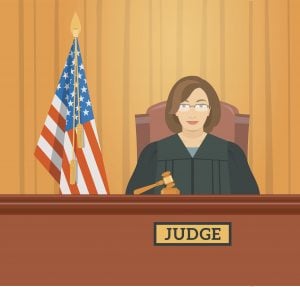Women’s Issues
-
 Biglaw
BiglawWomen Associates More Satisfied With Their Biglaw Jobs In Post-Pandemic World
This is unexpected... -
 Biglaw
BiglawThe Top Law Firms For Gender Equity & Family-Friendly Policies (2020)
Plus, details on firms that require employees to sign mandatory arbitration agreements and nondisclosure agreements.  Sponsored
SponsoredIs The Future Of Law Distributed? Lessons From The Tech Adoption Curve
The rise of remote work has dramatically reshaped the relationship between Lawyers and Law Firms, see how Scale LLP has taken the steps to get…-
 Biglaw
BiglawAttorneys Connecting Through Social Media In Times Of Isolation
Here all of it is shared and it feels like a safe space where one can finally feel heard and understood.
-
 Courts
CourtsRuth Bader Ginsburg Wants To Scrap The Equal Rights Amendment And 'Start Over'
The future is female, and the Notorious RBG thinks women can get this 'very important' task done. -

-

-
 Courts
CourtsAn Awesome Appellate Benchslap Calling Out Sexism In The Legal Profession
Sexist comments have no place in legal briefs, and these judges are doing something about it. -
 Law Schools
Law SchoolsThe Best Law Schools For Women (2020)
Law school may be the perfect place for women in America to resist, persist, and prove that the future is female.  Sponsored
SponsoredNavigating Financial Success by Avoiding Common Pitfalls and Maximizing Firm Performance
In this CLE-eligible webinar, we’ll explore the most common accounting pitfalls and how to avoid them for your firm.-
 Biglaw
BiglawIt's Not Your Imagination -- Women Are Leaving Biglaw In Droves
A new study attempts to find out why. -
 Biglaw
BiglawBiglaw Firm To Punish Partners With Stiff Financial Penalties For 'Bad Behavior'
How stiff are we talking? -
 Courts
CourtsWomen Of Color Have Dismal Representation As Supreme Court Advocates
And women in general are sorely missed at the high court, making less than a quarter of all appearances. -
 Courts
CourtsBarbie Has A New Career As A Judge, And It's Amazing
The future is female, and Her Honor even comes with a tiny gavel. -
 Biglaw
Biglaw5 Biglaw Firms Make Working Mother’s List Of The ‘100 Best Companies To Work For’ (2019)
Which law firms made the cut this year?
Sponsored

Is The Future Of Law Distributed? Lessons From The Tech Adoption Curve

The Business Case For AI At Your Law Firm


Navigating Financial Success by Avoiding Common Pitfalls and Maximizing Firm Performance
Sponsored

Early Adopters Of Legal AI Gaining Competitive Edge In Marketplace

Legal AI: 3 Steps Law Firms Should Take Now
-
 Morning Docket
Morning DocketMorning Docket: 09.25.19
* “The president must be held accountable. No one is above the law.” House Speaker Nancy Pelosi has announced that Congress will launch a formal impeachment inquiry into President Donald Trump. [Washington Post]
* Meanwhile, Senate Republicans have promised to quickly do away with any articles of impeachment that are passed by the House, especially if they’re based on the Mueller report, says Senate Judiciary Committee Chairman Lindsey Graham. This Ukraine incident, on the other hand… [The Hill]
* That having been said, Senate Republicans actually participated in and unanimously passed a bipartisan resolution calling on the White House to disclose the Ukraine whistleblower complaint. [Vox]
* And in the interim, the White House seems to be working on a deal to allow the whistleblower who filed a complaint against Trump to speak with congressional investigators, and the director of national intelligence is likely to release a redacted version of the complaint. [New York Times]
* Former Vice President Joe Biden supports the impeachment effort against Trump, saying that “[d]enying Congress information to which it is constitutionally entitled and obstructing its efforts to investigate actions is not the conduct of an American president.” [New York Times]
* According to Working Mother’s ranking of the Top 100 Companies, only five Biglaw firms made the cut for 2019. Not only that, but those firms are getting beaten by the Big Four when it comes to women’s success and family-friendly policies. [American Lawyer]
* In case you missed it, a “notable convicted murderer” in Wisconsin has reportedly confessed to the murder of Teresa Halbach — the murder for which Steven Avery and Brendan Dassey of Making a Murderer fame have spent years behind bars, all the while proclaiming their innocence. [Newsweek]
-
 Women's Issues
Women's IssuesBar Association Hires Man To Tell Women Attorneys How To Balance Their Lives
Warning: Mansplaining ahead! -
 Biglaw
BiglawRunning Our Own Gauntlets
Gender is going to matter in your career. You don’t want it to, but it is better to come to terms with it early. -
 Courts
CourtsRuth Bader Ginsburg On The One Thing That's Missing From The Constitution
The Notorious RBG is right on the money with this one. -
 Small Law Firms
Small Law FirmsLeaning Together: How A Work-From-Home Dad Made This Full-Time Working Mom Possible
Why is the choice to be a stay-at-home parent only one a mother can make? We work hard to make sure we are in this as a team. -
 Women's Issues
Women's IssuesThe Principles Of Poverty
The extent to which poverty relates to women possessing control over their own procreation decisions should embolden the removal of institutional barriers to birth control; instead, the exact opposite has occurred. -
 Biglaw
BiglawThe List Of Biglaw Firms At Least Trying To Care About Diversity
Congratulations to the firms that are working to make the legal profession a little more diverse.